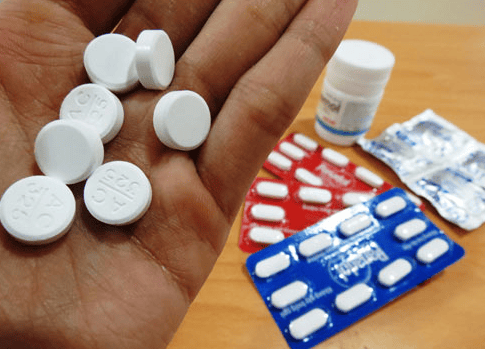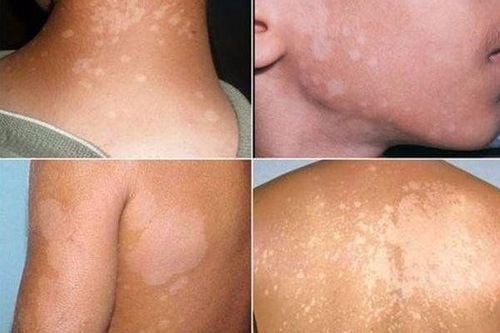This is an automatically translated article.
Eczema or Eczema is a relatively common dermatological problem in the community. While it does not cause a negative effect on overall health, eczema makes many people much less confident. Some people are also concerned about whether dysentery is contagious. Below, this article will help you answer questions related to eczema.
1. What is the state of leech nest? Eczema (or more briefly, Eczema) is a special atopic dermatitis, which is relatively pronounced with a series of blisters forming on the palms as well as the soles of the feet. These blisters will sometimes contain fluid inside, so the outside blisters and can burst if there is a strong impact. Initially, the disease only affects the hands and feet, but if left untreated, the disease can spread to the surrounding wider skin.
Also according to the progression of the disease, acne will initially appear with a small size, but then will slowly develop into large, painful and itchy pimples. At that time, the itching will make the patient scratch and uncomfortable, increasing the rate of infection.
Another negative effect of the disease is that the acne often grows in clusters, causing the patient a lot of trouble in daily life and making the patient's communication difficult and lack of confidence. .
Watch now: What to do when sick for more than 1 week?
2. What causes dysentery? The causes that cause patients to have eczema are very diverse and rich, in which, the most common ones are as follows:
Due to genetic factors: if your family has relatives suffering from dermatomyositis urticaria or hives, your risk of developing hives will be higher. People with sympathetic nervous system disorders have a higher risk of inflammatory skin diseases, including eczema. If you have to work in a hot and humid environment, your skin often has to sweat more, making skin problems more likely. Similarly, people who are exposed to a lot of chemicals and cleaning agents can also get hives. People who are prone to allergies are also likely to get the disease. People living in toxic, dusty, polluted environments. Allergies to foods, especially exotic foods or seafood. Eczema can also be a side effect of certain medications.

Giải đáp bệnh tổ đỉa có lây không?
3. Classification of Eczema Eczema Eczema is usually classified into the following main types:
Simple Eczema: This is a type of eczema that only forms small bumps on the skin, often causing itching and can spread. gradually, appearing first in the palm area. Infected Eczema: This is a more dangerous form of Eczema, often manifested as large acne spots, containing pus inside. Eczema bullous: This type of leech nest is common in the case of patients with leech hives due to allergies to chemicals, manifested as acne spots that are usually the size of a pea, the inside contains aqueous fluid, which is easy to break. . Eczema dry type: in this form of the disease, the acne spots often grow in clusters in a dry form, do not contain water inside, but often cause itching and flaking of the skin. 4. Is dysentery contagious? Is dysentery contagious? The answer is no.
The vast majority of skin problems are contagious, but this is not the case with ringworm. Basically, eczema is an individual problem. Although hives can spread from one area of the skin to another on the same body, the disease is not spread to others through casual contact. Dermatologists also emphasize: even if the blisters are broken and come into contact with the skin of the other person, the disease is not contagious to them.

Sử dụng thuốc chống nhiễm khuẩn bôi ngoài da khi mắc bệnh tổ đỉa
5. Is leech indigo dangerous? Although it is a skin problem, when left untreated, eczema can become more severe, causing itching, redness, and extreme discomfort. The more widespread the disease, the smaller the blisters will grow larger, often with blistering characteristics, which can burst into fluid, causing pain to the patient.
In the case of broken acne, if you do not have the right treatment method, they will become infected and make the treatment process longer, take more time and waste money, create depressed psychology for patients.
6. How is Eczema Treated? Thus, the issue of whether eczema is contagious has been answered, you can be completely assured when communicating with others without worrying about infecting them. However, if left untreated, your skin will experience many unpredictable effects.
6.1. Topical treatment of eczema Eczema in mild cases will be treated locally with a number of methods:
Soak the affected skin area in a dilute solution of potassium permanganate with the ratio specified by the doctor. Apply BSI 1% - 3% to the skin that contains acne. Apply an anti-infective medication to areas of pustules that have ruptured and become infected. For blister blisters, you can prick and then apply medicine. However, the injection technique needs to be performed by medical personnel to limit infection.
6.2. In case the disease progresses more seriously (infective acne, pus inside...), the patient will be prescribed a number of treatment drugs, including anti-infective drugs applied to the skin. with antibiotics and anti-inflammatory drugs. In addition, antifungal drugs such as Clotrimazol, Ketoconazole will also be used in treatment.
In general, the question of whether the disease is contagious has an answer: you do not need to worry when you come into contact with a patient with this disease. However, if you are suffering from an illness, it is important to quickly find a doctor for treatment as soon as possible.
Follow Vinmec International General Hospital website to get more health, nutrition and beauty information to protect the health of yourself and your loved ones in your family.
Please dial HOTLINE for more information or register for an appointment HERE. Download MyVinmec app to make appointments faster and to manage your bookings easily.













